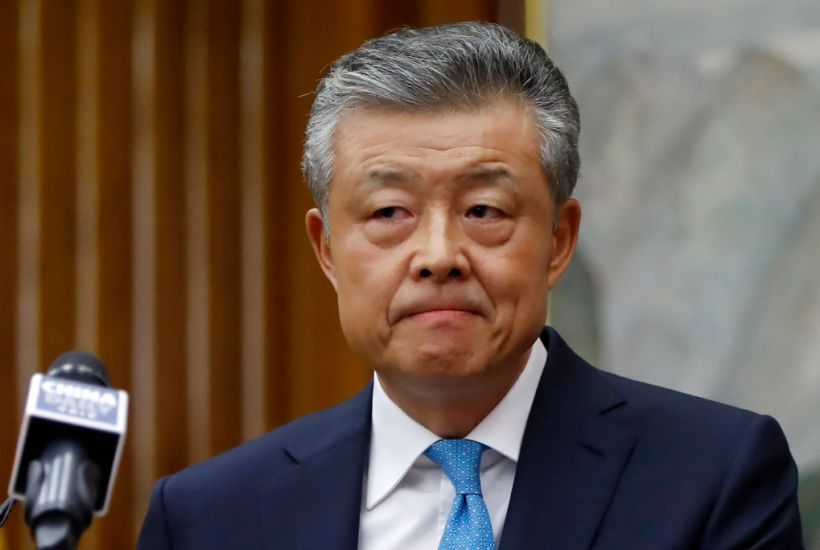What can the UK learn from Australia and its occasionally rocky relationship with China? The welcome decision to ban Huawei from Britain’s 5G network has prompted concerns that China will find a way to hit back. This is hardly surprising, as the Chinese ambassador to London, Liu Xiaoming, has warned Britain that ‘if you want to make China a hostile country, you will have to bear the consequences’.
Australia is perhaps further down the same road. It has not gone out of its way to anger China but decisions the Australian government has taken over the last six or seven years have nonetheless had that effect.
First, there was the decision to ban Huawei from the national broadband network. At that time, in 2012, the Chinese government barely reacted. But the new generation of ‘wolf-warrior’ diplomats certainly reacted more harshly to a decision by the Australian government in 2017 to reveal Chinese attempts to influence Australian politicians. In recent years, Australia has also drawn attention to Chinese attempts to influence the curricula of universities and – without naming China specifically – the government has made public its concern about cyber offensive operations against Australia, its government, agencies and the private sector.
Further afield, Australia has also been forthright in complaining about China’s militarisation of the South China Sea and has sent its own warships on freedom of navigation exercises through the area on many occasions. This has been done in coordination with the United States.
In 2020, the Australian government was the first government to call for an independent inquiry into the causes of the coronavirus outbreak. Initially, that was fiercely resisted by China but when the international community backed the Australian initiative, China relented and allowed such an inquiry under the auspices of the World Health Organisation. Most recently, the Australian government has been forthright in its criticism of Beijing’s so-called security laws undermining the joint declaration on Hong Kong. Australia has also offered to extend the visas of Hong Kong students studying in Australia.
On the face of it, Australia is vulnerable to Chinese influence. More than 30 per cent of its exports go to China and tens of thousands of Australian jobs depend on trade with China. China is also a significant investor in everything from resources to property and agriculture in the Australian economy. A casual observer may therefore think that Australia has been foolhardy to be such a significant critic of the behaviour of the Chinese government.
Admittedly, there have been some consequences. China has taken some steps to restrict Australian exports. It imposed a crippling 80 per cent tariff on Australian barley exports to China earlier this year. Those were worth around £300 million in 2019. China has also put in place some obstacles to exports of beef from Australian abattoirs, forcing farmers to look for new markets elsewhere in Asia.
But despite that, Australia’s exports to China have in recent months reached record levels because of growing demand for iron ore and agricultural products. China could source those products from elsewhere but it would be hard-pressed to find sources which are as reliable and of such high quality as China can get from Australia. After all, China does not import from Australia in order to do Australia a favour. It imports from Australia because it is in China’s interest to do so.
It is worth noting that the Chinese ambassador in Australia has issued bloodcurdling threats that Australia will be punished and suffer for its criticism of China. The Chinese government has likewise said it wants to discourage Chinese students studying in Australia and Chinese tourists coming to Australia. That, of course, is not particularly relevant at this time when international travel into Australia is limited by steps taken to contain the spread of coronavirus. But over time it is possible Australia could lose at least some of that market.
Like China, however, the Australian government believes it is important to play the long game. So there are three major considerations that Australia has taken into account.
First, it believes it is fundamentally important that whatever the trade consequences Australia should stand up for its own values and its belief system. It is prepared to call out attempts to undermine its institutions and to mount cyber offensive operations against Australia. It is prepared to defend itself, even if there may be a monetary cost.
Secondly, Australia is opposed to any kind of policy of containment of China. It believes in collaboration and cooperation with China and understands that China needs to have a say in the way the rules-based international system operates. But if it breaches the international rules-based system, as it has in the South China Sea and over Hong Kong, and thinks it can get away with it, then it will try to change the status quo by force and that will over time run the risk of causing conflict. It is important to stand up for the rules-based international system even if that too involves a monetary cost.
Thirdly, the Australian government believes there should be an appropriate balance of power in the Indo-Pacific region. The Indo-Pacific cannot be subjected to Chinese hegemony. The Australian Government rejects the idea of the Indo-Pacific being subjected to a Chinese Monroe doctrine. It is a region which must have an appropriate balance of power. In the interests of peace and managing the rise of China, there must be a continual and significant American presence in the region and Australia would also welcome the involvement of the UK, through commitments such as the Five Power Defence Arrangements – which have involved the United Kingdom, Australia, New Zealand, Malaysia and Singapore since the early 1970s – to contribute to that power balance.
Overall, the Australian government’s view is that in the medium-term China must understand that there are rules which must be followed to ensure a peaceful regional environment, while at the same time welcoming the rise of the Chinese economy. That has meant tough decisions.
In time, it is hoped that Beijing will recognise that its wolf-warrior diplomacy of recent years is counter-productive. It is driving the Western allies closer together and encouraging other countries to work closely with them. One of the best examples is the shift in Indian diplomacy more towards the West as it endeavours to balance Chinese power.
The lesson for the UK is as follows. It should stand up for what it believes is right: the rules-based international system and the UK’s liberal democratic values. History has shown that putting pecuniary interests before values and geopolitical balance will lead to outcomes far worse than the possible loss of a few markets.
Got something to add? Join the discussion and comment below.
Get 10 issues for just $10
Subscribe to The Spectator Australia today for the next 10 magazine issues, plus full online access, for just $10.
Alexander Downer is chairman of Policy Exchange and former Australian high commissioner to the United Kingdom




















Comments
Don't miss out
Join the conversation with other Spectator Australia readers. Subscribe to leave a comment.
SUBSCRIBEAlready a subscriber? Log in